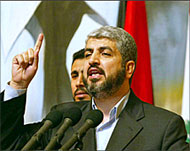Syria defies US sanctions
Syrian President Bashar al-Asad said the United States has provided no proof to warrant imposing sanctions on his country.

Al-Asad added he would not bow to US demands to expel members of Palestinian resistance movements.
The Syrian leader disputed the case that the Bush administration had made to impose the embargo, saying Syria does not have weapons of mass destruction and there is no evidence of foreign fighters crossing the border from Syria to Iraq.
He said Syria had asked Washington for evidence of infiltration from Syria into Iraq.
“We have no response to the request to give us one passport, one name … So far, we haven’t received anything,” al-Asad told a group of US editors.
Al-Asad met the editors at the presidential palace while they were on a fact-finding trip arranged by the Washington-based International Reporting Project.
President George Bush imposed the sanctions on Tuesday. The sanctions ban all US exports to Syria except food and medicine and they forbid direct flights between Syria and the United States.
The penalties came as a response to allegations that Syria was supporting terrorism and undermining US efforts in neighbouring Iraq. Bush signed the order under a law that Congress passed by an overwhelming vote late last year.
‘Little effect’
Al-Asad tried to play down the impact of the sanctions.
“In fact, we do not have any reaction,” he said when first asked about the embargo. “Not because that does not affect us, but we do not know so far how they will affect us.”
 |
|
Hamas official Khalid Mishaal |
Bilateral trade amounts to $300 million annually. Syrian officials have said the embargo will have little economic effect. The European Union is ignoring the sanctions and sending a high-level trade delegation to Damascus this weekend.
“Syria will continue to live its daily life, but we will continue to be always open” for dialogue, especially on the Middle East and Iraq, the Syrian leader said.
Syria hosts Palestinian resistance movements such as Islamic Jihad and Hamas which are regarded as terrorist organisations by Israel and the United States.
Al-Asad’s government regards them as legitimate groups fighting Israel’s occupation of Palestinian land. Syria is on the US State Department’s list of terrorist-sponsoring countries.
Border concerns
Al-Asad said on Thursday “there are no leaders” of Hamas and Islamic Jihad in Syria, only political spokesmen who came to Syria after being expelled by Israel. There was no place for these Palestinians to go to, he added.
|
“If you ask them (Palestinian resistance officials) to go, where could they go? .. They have to go back to their land and Israel could put them in jail … We don’t expel people. They should go back home” |
“If you ask them to go, where could they go?” al-Assad said. “They have to go back to their land and Israel could put them in jail … We don’t expel people. They should go back home.”
The head of Hamas’ political bureau, Khalid Mishaal, the group’s highest-ranking official, has lived in Damascus since 1999. The leader of Islamic Jihad,
Ramadan Abd Allah Shallah, moved to Syria in the 1990s.
The United States has accused Syria of failing to stop “guerrillas” from crossing its border into Iraq. The Syrian government maintains it is trying to stop fighters from crossing into Iraq, but cannot completely control its long border with its southeastern neighbour.
Al-Asad said it is difficult to control the Syrian-Iraqi border, adding there was a history of Iraq sending saboteurs into Syria in the 1980s when Damascus sided with Iran in the Iran-Iraq war. Even today, he said, arms are smuggled from Iraq to Syria.
Abuse criticism
Al-Assad, who strongly opposed the US-led invasion of Iraq, criticised the US occupation of the country, saying it was destabilizing the region and fueling anti-American feelings.
“Under (former Iraqi President) Saddam Hussein, there used to be a dictatorship. And now there is no democracy. So things haven’t changed that much. The problem is much larger than the prisoner problem,” al-Assad said, referring to the pictures of US soldiers abusing Iraqis in Abu Ghraib prison, Baghdad.
“I think what we saw in those photos goes beyond my human feeling,” al-Assad said. He said the torture and humiliation of Iraq prisoners ran counter to the US attempt to portray itself as a democracy.
“Is this the democracy of the Abu Ghraib prison? … I think that these sort of scenes establish a kind of hatred for the United States,” al-Assad said.